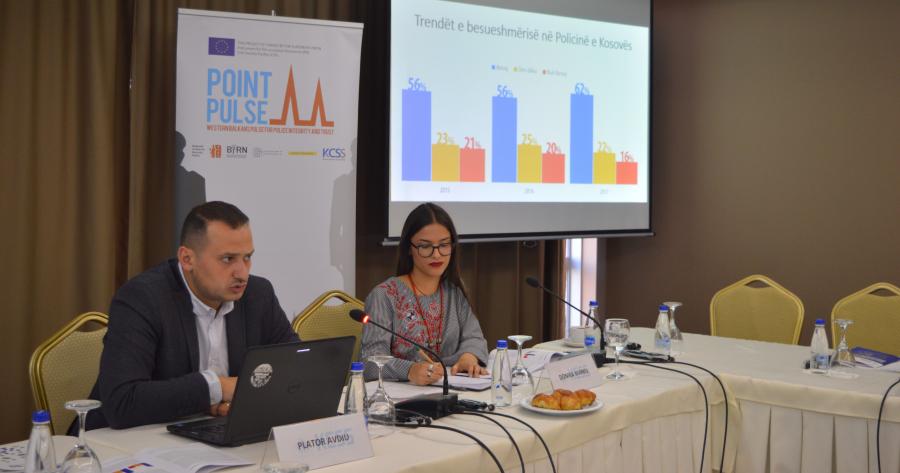4/06/2018

Kosovar Centre for Security Studies (KCSS), on Monday, 28th of May has published its research paper titled “Citizens’ perception trends on Kosovo Police versus reality (2015-2017)”. This publication has derived as a continuation of the KCSS special program titled "Monitoring and Evaluating Integrity within Kosovo Security Institutions. The report covers 2015 – 2017 period of perceptions of respondents from Kosovo Security Barometer, and also includes monitoring of the integrity related activities of Kosovo Police during the first half of 2018, with particular emphasis on preventing and countering the phenomenon of police corruption.
Regarding the public trust, there is a positive trend on perceiving Kosovo Police as a reliable institution from the citizens. On 2015, around 56 percent of respondents from Kosovo Security Barometer declared that they trust Kosovo Police, the same percentage as 2016. Meanwhile, on 2017 the trust towards Kosovo Police was 62 percent, a raise of 6 percent compared to previous years. On the other side, the respondents from South Mitrovica have the highest rate of trust towards Kosovo Police (around 78 percent in 2017), while those from northern municipalities of Kosovo, mostly belonging to Serbian community in Kosovo, have the lowest rate of trust in the Kosovo Police (about 10 percent during 2017).
Respondents were also asked about their views on what is the selection criteria for employment in Kosovo Police. From 30 to 35 percent of citizens think that this process is done through a public competition – where we see a 5 percent raise from 2016 to 2017. However, some of the respondents perceive that other negative factors influence the recruitment process in Kosovo Police. As a result of this, family ties/nepotism (31 percent), political ties (25-18 percent) and bribery (from 11 to 12 percent) are some of the phenomena that have negative impact on the recruitment process.
Regarding the extent of police corruption, there is an increase of corruption in Kosovo Police. While in 2015 around 27 percent of the respondents perceived that Kosovo Police is corrupted, on 2016 there was a decrease on citizens’ perception regarding this matter, with 11 percent of them perceiving Kosovo Police as corrupt. However, in 2017 there is a noticeable increase when the results are compared with 2016. During 2017 around 28 percent of the respondents stated that Kosovo Police is corrupted, marking an increase of 17 percent compared to 2016.
The results from Kosovo Security Barometer related with Police, especially those related to policecorruption reveal the need for police internal control mechanisms to be strengthened and be more pro-active in preventing police corruption, in order to strengthen institutional integrity of the Police. This would undoubtedly influence on the reduction of this negative phenomenon, given the fact of the existing suspicions that some police officers are involved in corruption and bribery.
With this publication, the KCSS has ended the three-year project on Monitoring and Assessing the Integrity in the Security Institutions in Kosovo. Through this project, the KCSS has actively monitored, reported and advocated on integrity issues in Kosovo security institutions. Parallel to this, KCSS has offered support for capacity building of these institutions over the past three years to achieve the necessary standards in this field. It should be noted that during this project, the two key security institutions with which the KCSS worked on this project, the KSF and the KP, have drafted their Integrity Plan – a key objective of KCSS. Also, this project has laid the foundations and has further consolidated the cooperation between civil society and security institutions, especially in the field of integrity.
This project is financed by the Project Promotion of Democratic Society Party (DSP), funded by the Swiss Cooperation Office in Kosovo (SCO-K) and managed by Kosovar Civil Society Foundation (KCSF).